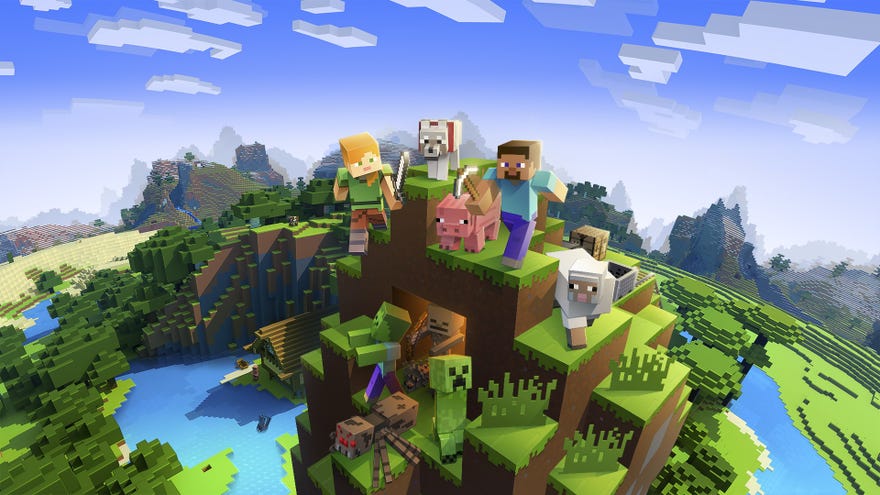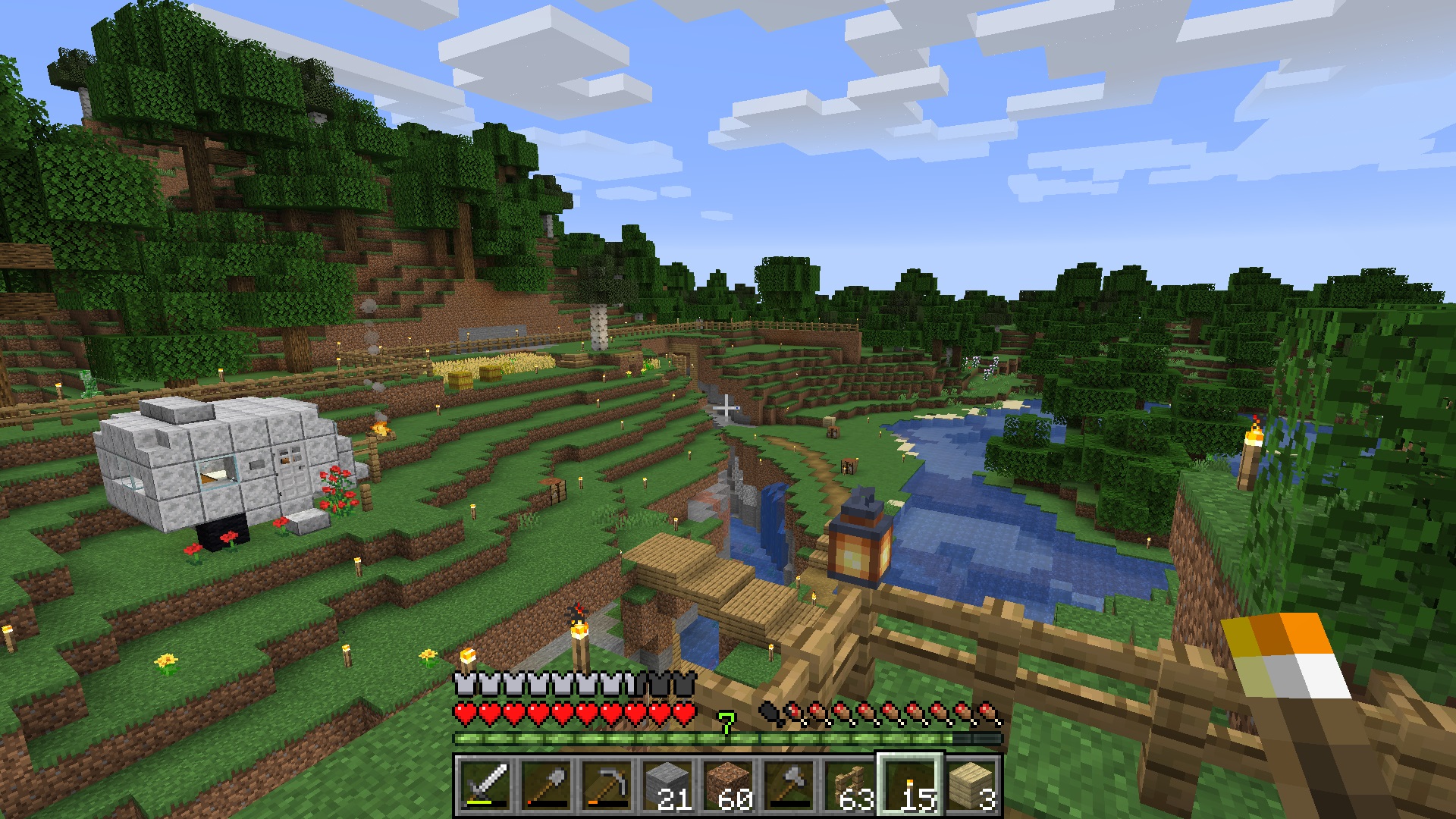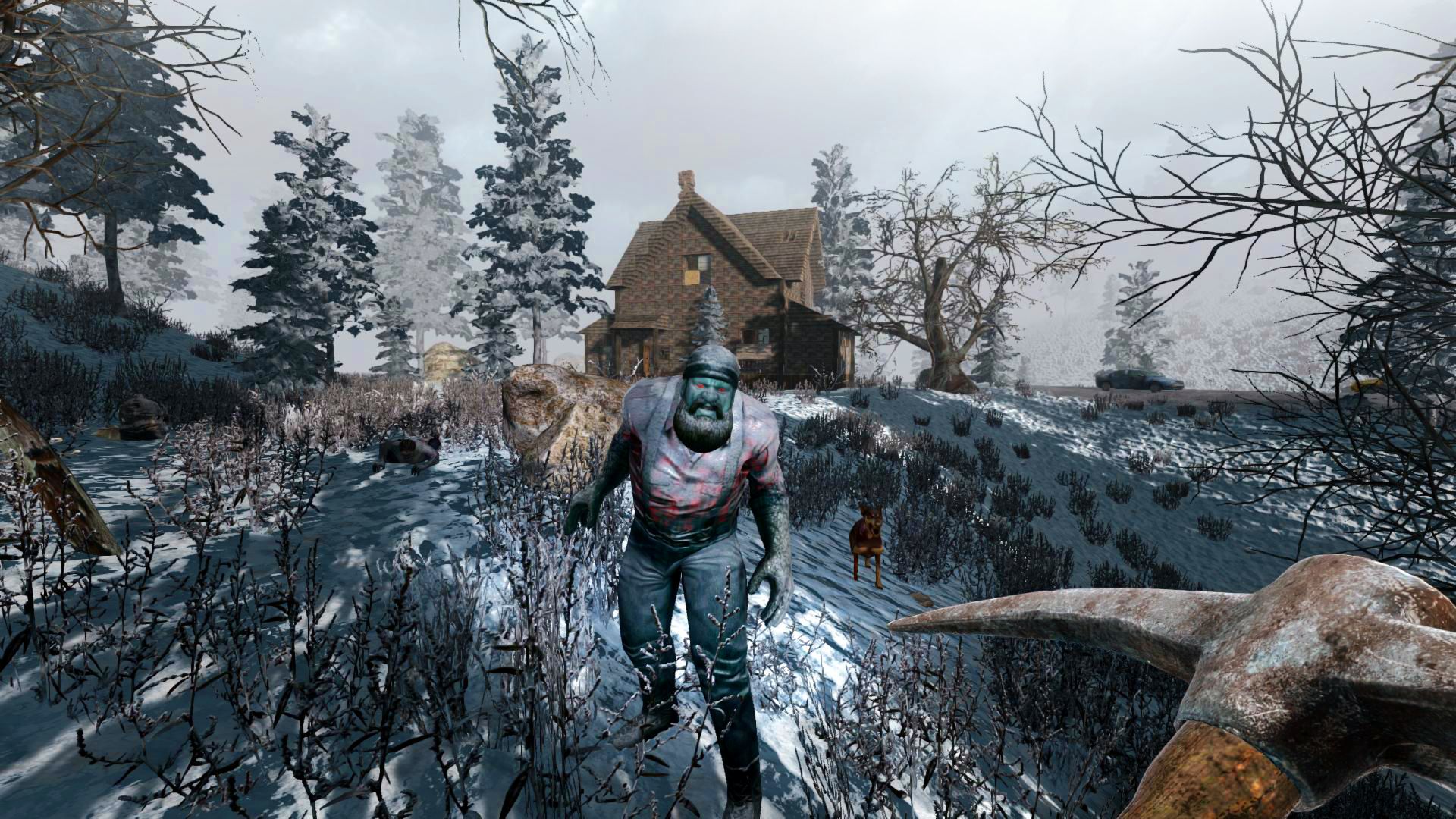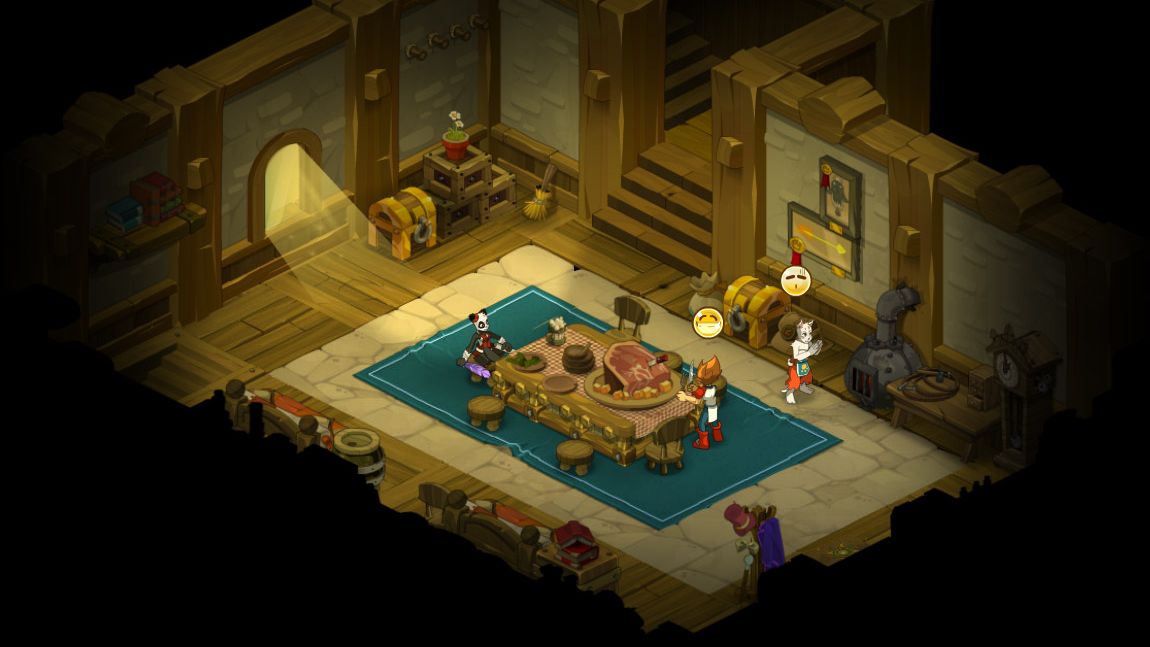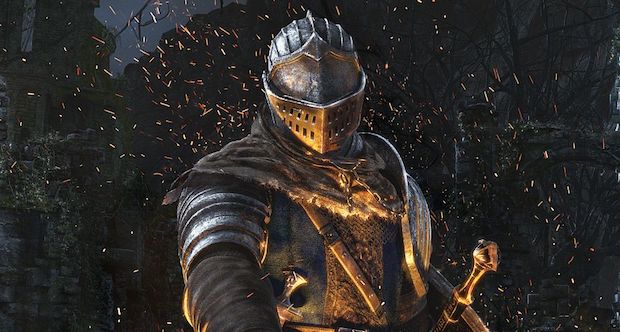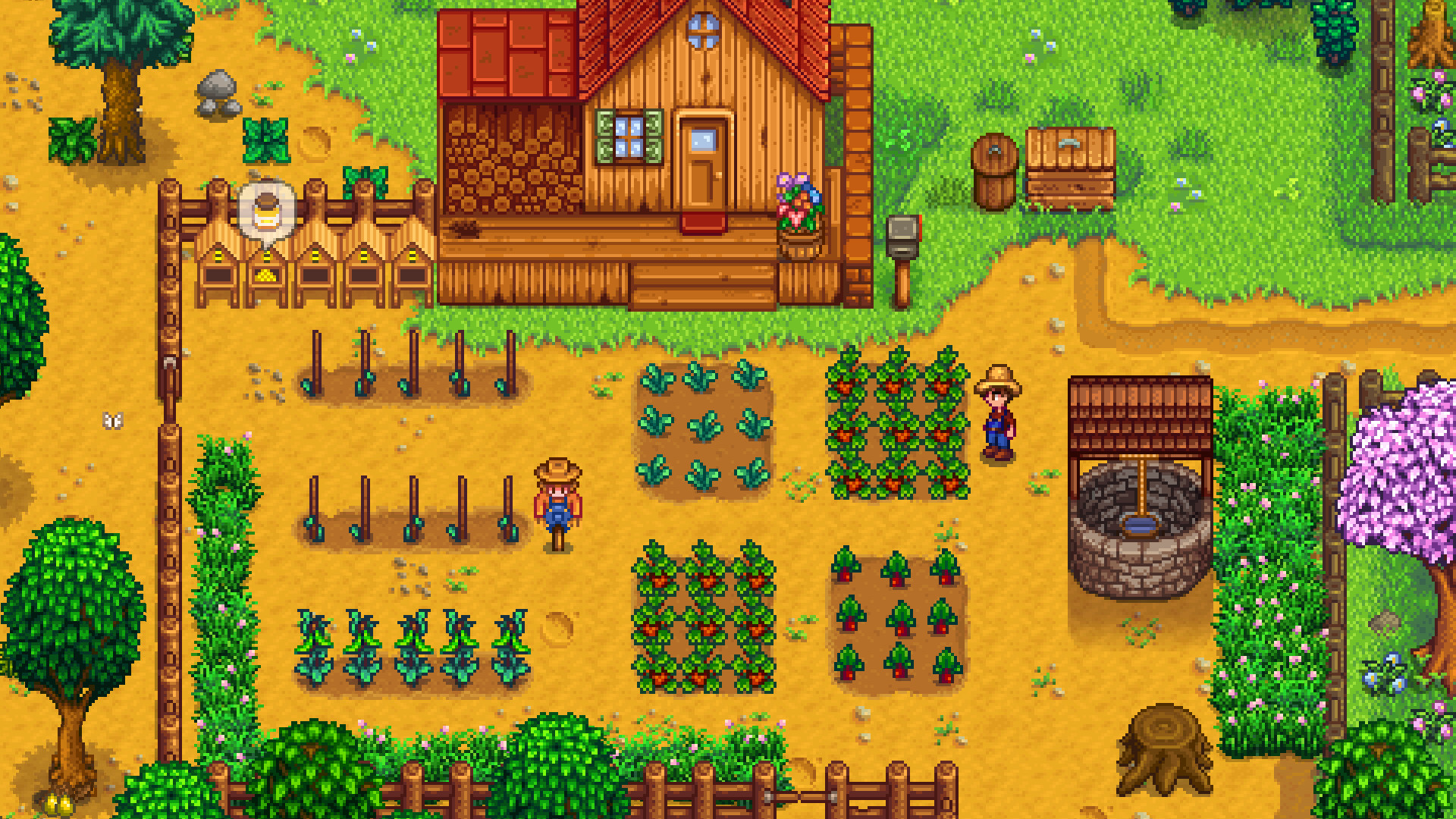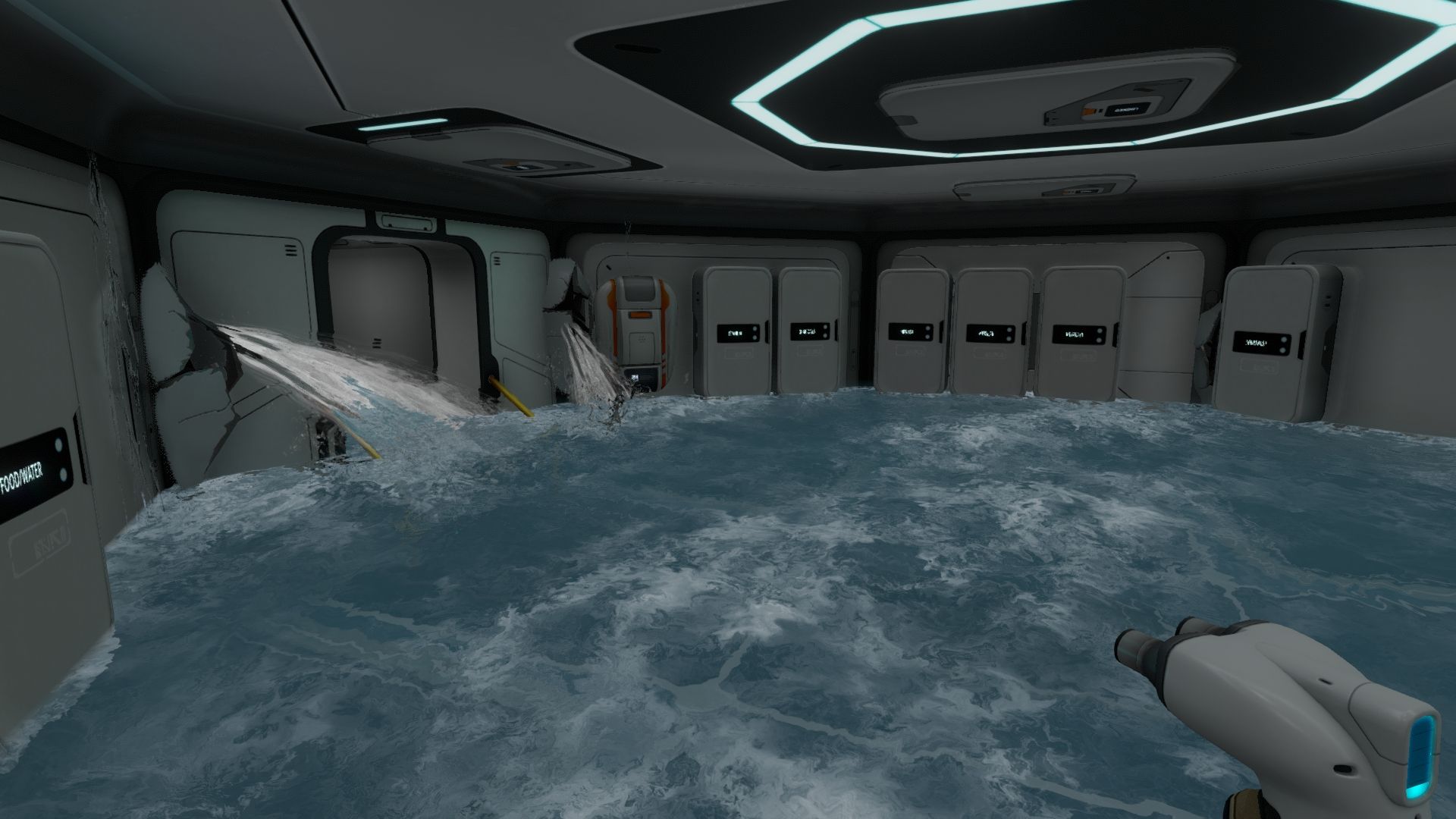Game DNA: Making yourself a home
Why every survival game needs wheat
I was homeless when I discovered Minecraft -- not homeless in the street-sleeping sense, thankfully. Only in the sofa-surfing sense. I had a bed, even. The creaking cabin bed of two friends who took pity on me and let me crash for a few months in their house, while I sullied my fingertips with sambuca in a dank Yorkshire nightclub for part-time pound coins. My chin-scratching uni days had just ended, but I stubbornly refused to go back to my family house in Northern Ireland. I could do this, I reasoned, I just needed time.
Then my friend showed me how to punch a tree, and I found a new home.
This was the winter of 2010, and the blocky game about digging deep and keeping your house safe from tall green exploders was taking off. I built a small cobblestone castle, a high-walled place of safety from the terrors of the night. It made sense to me, this dream world about building a house from whatever you could gather from nature. It’s a game about home, about creating a sense of belonging from hollowed dirt and lumps of coal. About having a place where you know the hills and lakes, and hold some measure of control over the muck around you. There are no landlords in Minecraft, and this is the real reason an entire generation loves it.
This is also why the entire survival genre which appeared shortly afterwards spoke to me. Every survival game for me is about chasing the dream of home. Of a place where I belong, a place that – this time – will be perfect and stable and good and free.
Once you’re away from your childhood home for long enough, it stops feeling like home and more like a house you used to live in. As an itinerant Irishman who would later spend five years swimming from house to house in London, as annual waves of rent hikes threatened to drown me and my housemates, I found survival games strangely familiar. In The Long Dark, you have to survive the cold of houses without adequate double glazing or insulation. In 7 Days To Die, you huddle within a cobbled-together stronghold that comes under regular attack from hordes of zombies, and eventually crumbles, forcing you to flee and move on to the next log cabin or concrete skyscraper, whichever looks sturdier. To this day my great fear is not being able to pay rent. I have nightmares about undead estate agents.
But it was Minecraft - the granddaddy, the big blocko, Infiniminer for farmhands - that I always look to for that feeling of homeliness. Maybe because it’s bright and airy and childlike. Or maybe because I always plant a wheat field. Always. Some transient memory from childhood compels me to do this. Some vague flashback of running through endless stalks of cereal, barbs to the sky, a golden sea of future Cheerios, and falling into yellow straw. That memorious waft is always enough to make me build the wheat field, time and again, and its glow always makes me feel like this rustic blockworld could be home, even for an hour or two.
As a youngster I tried to find home in MMOs, in their town squares, their looping quests and the comfortably familiar search for sharper swords. The amount of people who glaze over wistfully with a sense of belonging when thinking of World Of Warcraft suggests that home is simply wherever you have wasted enough of your early life in idle pursuits. And to a lesser extent, I’m guilty of that too.
I have unclear memories of Second Life and Habbo Hotel, the kinds of too-colourful places which would have desperately liked to be considered home, were code and asset capable of sentient thought. I made chat-channel friends in Dofus, virtual neighbours in a town full of bone sellers. I liked Dofus because you could spend a whole country evening in bucolic mindlessness, cutting flax with a scythe. I tried my best to live well as a friendly zombie in browser-based groan ‘em up Urban Dead. But I have never been able to shake the ennui that inevitably comes from an MMO, I always see the rat wheel before I see the fireplace. Today, I see the distorted reflection of those hollow MMO homesteads in the modern high-rise apartments of GTA Online, clinical IKEA abodes handed out to all players like trays of identical airport food. There’s no home in these places for me. A good holiday, maybe, a nice bank holiday weekend in murdertown. But not a home.
I left my own ancestral murdertown in Northern Ireland at 18, and resolved never to live there again. The resulting years of Anglicisation and global wandering have given me one of those cliché dual identities where I no longer know which nation is really mine, even though it says Ireland on my passport and I feel an instinctive anger when I see the Queen on television. I have since lived in Costa Rica and Spain, and I still don’t really know where I belong. I cry when Hercules sings “Go the Distance”. It’s a touching musical number.
Some games came close to bringing me the home I yearned for. Dark Souls is not a survival game so much as a dying game. You don’t build things in Lordran, but the looping shortcuts, that practice of always returning to Firelink Shrine gave it a feeling of safety and homeliness that I appreciated from the cramped caveroom of my third London house. Firelink was an unsheltered campfire in a grotty ruin, but at least it did not feature a bathroom tap with water that delivered inexplicable electric shocks. Looping back to the bonfire doesn’t feel like coming home exactly, but it does feel like meeting your brother in an old teenage drinking haunt as he grumpily pokes the fire from his usual seat on the big stone. And that’s home of a sort.
You soon realise there are endless RPGs about leaving home, but so few about finding a new one. It’s why the nascent village of Ashen made me smile, building around you as the game goes on. It’s why Else Heart.Break() felt so melancholy and bittersweet, because it is a game about arriving in a new city and trying to make unknown streets feel like home, even when the only sleeping quarters you have is a box-sized room in a hotel. It’s a game about crashing on sofas and drinking with new friends. There is a bum who slurps beer on a harbourside bench in this game, who retreats to an alleyway mattress when the clockwork day and night cycle brings out the stars. He reminds me to be glad I have only wanky metaphorical homelessness, and not the real kind.
Among homebuilder games, Stardew Valley tried the hardest to coax me into a new life. It was explicit and unconditional in its rural dream-selling (quit your job, you're a farmer now). It’s hard to say no. I planted my wheat field here too, in the rugged acre of a game hosted by the woman who would rescue me from London landlords and carry me off to Central America, to try to live a sunnier life. Co-op farming servers are good places to have arguments about household chores. Much better than arguing about how best to cook rice in the dark ground-floor flat of a Costa Rican town, where the dust of distant volcanoes secretly covers your keyboard in the night, and the mosquitoes fall in through an exposed brickwork shaft like tiny bloodsucking snowflakes. The woman who carried me off still plays Stardew Valley, but I packed my stuff and left the farm. I heard she married a flautist called Abigail. But that's okay. I got married in real life.
Of all the games that strive to offer you a place worth resting your head, Minecraft has always been the best. Every survival game I’ve played since has been chasing that memory, that tiny castle with its crude stove, its vast patch of wheat outside. The only game that comes close is Subnautica, the sci-fi Robinson Crusoe life of salty trials.
When you first crash-land in the shallow reef of this water planet, it’s hard to think of making this world a home. The fish here explode. Eventually, that worry subsides, you learn more about the coral, the animals, and you find yourself building a double bed in a giant titanium dome, with a wide window so you can watch the peaceful waves as you drift off to sleep. I began Subnautica in one dinky Spanish flat, and completed it in another (much better) one, and I like that its wide ocean stretched across these abodes like the Bay of Biscay, but with more electric eels.
Yet even by the end of your aquatic adventures on Planet 4546B, you realise this is not home. As much as you have carved out a place for yourself among the coral, you still don’t belong. You are the alien in this ecosystem, and even though it is a beautiful place, your mission is still to Tom Hanks your way out of there. So you do, and leave behind a place of wonder.
I have lived in three different countries in the space of five years. I have lived in hot concrete cities where the ants have had as much claim to the house as I did. In damp London boxes and Basque demi-flats. I am no closer to feeling at home now, than when I first discovered the joy of burrowing a nightly bolthole in Minecraft to escape the hollow rootlessness I felt between Yorkshire night shifts, serving surreal cocktails I did not really know how to make. Every survival game (and even some non-survival games) I have played reflects that wandering search for a good mud hut. I hop from one game to the next, chasing a feeling I have not truly felt since I was a child, coming in the front door after grumpy, homesick sleepovers.
Back in that harsh winter that I discovered Minecraft, I eventually went back to my family’s house in Ireland. My dad came and drove me home through Welsh snow, and ferried me over choppy non-Subnautican seas, back to ancestral murderville. Homelessness, even a non-critical homelessness, will break down all resolutions. Post-university skintness is its own survival genre.
There’s a field next door to my family home overgrown with an unnatural thicket of some kind of un-willow. These thin, sickly trees are supposed to be harvested, and compacted into chunks of clever biofuel. But in 2013 the enterprising con artists of the Irish North discovered a loophole in this biofuel’s tax break, and figured out they could essentially burn wood for money. The government had done its sums wrong, and it was years before they realised that shady farmers had been throwing chunk after chunk on pointless fires, heating empty sheds to get cash from a government too stupid to do basic arithmetic. They were pumping out smoke with a fuel that was supposed to be environmentally friendly, destroying the planet for banknotes using the very trees that were supposed to help save it. The Northern Ireland government may be doing nothing to combat the stereotype of idiocy suffered by our pseudostate, but at least our criminals understand irony.
Those thin trees are still there. They grow like a wild forest even today, like bamboo, in that field behind my old house. I see it when I visit. The farmer won’t bother cutting the lanky plants. Now that the tax con has been discovered, they’re nothing but a bunch of worthless oxygen machines. Ugly, unprofitable, infested with a kind of beetle nobody recognises. These are trees one cannot punch.
But it wasn’t always like this, wasn’t always so green outside my family’s house. Decades ago, every Autumn would begin with the revving of a combine harvester, with full days of sunny field work and the glimmering harvest of barbed gold.
It used to be a wheat field.
